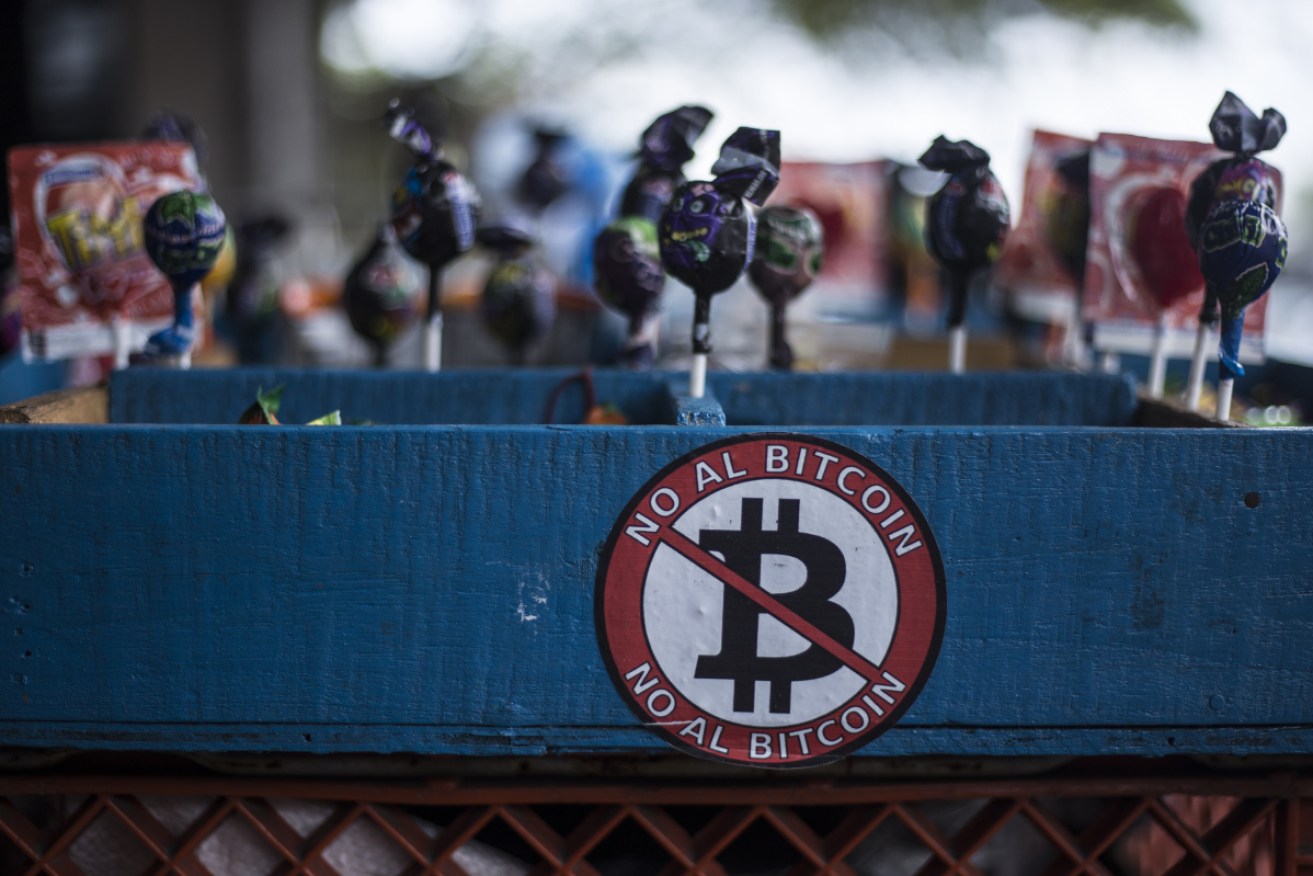Bitcoin price plunges as El Salvador makes it legal currency


Not everyone is happy about bitcoin being declared legal tender in El Salvador. Photo: Getty
Bitcoin prices have plunged on the day that central American country El Salvador adopted it as legal tender.
El Salvador’s sovereign bonds fell as much as 6 percentage points in secondary market trading in the US on Tuesday (local time), to 87.11, as the price of bitcoin dropped sharply.
Bitcoin prices dropped as much as 18 per cent, to about $US43,119 ($A57,980), a low not seen since mid-August, according to financial markets news service Refinitiv Eikon.
In the US, market traders said the sharp sell-off was also caused by a Supreme Court ruling allowing El Salvador’s President, Naib Bukele, to serve two consecutive terms.
There were also teething problems in the South American country when the government had to unplug a digital wallet to cope with demand.
Mr Bukele, who pushed for El Salvador to adopt the cryptocurrency, called for help from users who had already downloaded the government-backed app, to test if it was working properly.
“Could you please try to register and post in the comments if there are any errors or if the whole process works fine?” he wrote on Twitter.
Mr Bukele said using bitcoin would help Salvadorans save $US400 million ($A541 million) a year on commissions for remittances while giving access to financial services to those with no bank account.
Carlos Garcia, who went to a shopping centre information booth giving out advice on the new currency on Tuesday to learn about how transactions would work, was excited about the opportunities bitcoin could provide.
“El Salvador is taking a great step forward today,” he said.
However, the poorest might struggle to access the technology needed to make bitcoin work in El Salvador, where nearly half the population has no internet and many more only have sporadic access.
“I’m going to continue suffering with or without bitcoin,” said sweet-seller Jose Herrera, who said he had trouble accessing a mobile phone.
Others said the move might fuel money laundering and financial instability.
It has already muddied the outlook for more than $US1 billion in financing that El Salvador is seeking from the International Monetary Fund.
Mr Bukele, 40, is Latin America’s most popular leader but has been accused of eroding democracy, not least by the administration of US President Joe Biden.
Mr Bukele blamed Apple Inc, Google and Huawei’s app download platforms for the delay.
“Release him! @Apple @Google and @Huawei,” he wrote in a tweet, accompanied by a red-faced “angry” emoji.
The wallet was later available from Huawei.
Google and Apple did not immediately respond to requests for comment.
Polls indicate Salvadorans are wary of the volatility of the cryptocurrency, which can shed hundreds of US dollars in value in a day.
Ahead of the launch, El Salvador bought 400 bitcoins worth about $US20 million, Mr Bukele said, helping drive the price of the currency above $US52,000 for the first time since May.
Hours later, however, bitcoin had weakened and last traded down 8.84 per cent at $US47,327.32.
Ethereum, another crypto currency, fell 10.52 per cent to $US3,537.62, while crypto exchange Coinbase Global slid 3.96 per cent after reporting delays in some transactions on its platform.
The change means businesses should accept payment in bitcoin alongside the US dollar, which has been El Salvador’s official currency since 2001 and will remain legal tender.
It remains unclear whether businesses will be penalised if they do not accept bitcoin.
In the run-up to the launch, the government installed ATMs that allow bitcoin to be converted into US dollars and withdrawn without commission from the digital wallet, called Chivo.
“Like all innovations, El Salvador’s bitcoin process has a learning curve,” Mr Bukele tweeted.
“Not everything will be achieved in a day, or in a month.
“We must break the paradigms of the past. El Salvador has the right to advance towards the first world.”
-with AAP








